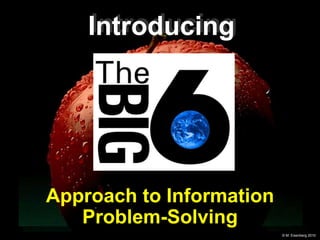More Related Content
Similar to Introducing the big6 (20)
Introducing the big6
- 2. •We all suffer from
information overload.
There’s information
EVERYWHERE!!! The
irony is that when
students or ourselves
need it, we aren’t able
to effectively find
relevant & authoritative
information.
© M. Eisenberg 2010
- 3. Information Literacy
“To be information literate, a person
must be able to recognize when
information is needed and have the
ability to locate, evaluate, and use
effectively the needed information.”
American Library Association, 1989
© M. Eisenberg 2010
- 4. THE BIG6 and the
Common Core
CCSS.ELA-Literacy.W.8.1 Write arguments to support claims with clear
reasons and relevant evidence
CCSS.ELA-Literacy.W.8.2 Write informative/explanatory texts to
examine a topic and convey ideas, concepts, and information through
the selection, organization, and analysis of relevant content
CCSS.ELA-Literacy.W.8.7 Conduct short research projects to answer a
question (including a self-generated question), drawing on several
sources and generating additional related, focused questions that allow
for multiple avenues of exploration
CCSS.ELA-Literacy.SL.8.1a Come to discussions prepared, having
read or researched material under study; explicitly draw on that
preparation by referring to evidence on the topic, text, or issue to probe
and reflect on ideas under discussion.
© M. Eisenberg 2010
- 5. ™
The Big6 Skills
1. Task Definition
2. Info Seeking Strategies
3. Location & Access
4. Use of Information
5. Synthesis
6. Evaluation
© M. Eisenberg 2010
- 6. Usage of the BIG 6
Examples:
• Science & Math Fair – The research
component
• Argumentative Essays – Finding facts to
support a claim
• Short papers and oral presentation -on
the problems and solutions of proposed
inquiry based questions.
• Life-long learning interest – the ability to
answer questions and inform ourselves
© M. Eisenberg 2010
- 7. Task Definition
1.1 Define the problem
1.2 Identify the information
needed
TYPES OF INFORMATION,
BRAIN STORMING, AND
THESIS GENERATING
© M. Eisenberg 2010
- 8. Information Seeking
Strategies
2.1 Determine all possible
sources
2.2 Select the best sources
Continue brainstorming and
use Internet skills to seek
information
© M. Eisenberg 2010
- 9. Location & Access
3.1 Locate sources
3.2 Find information within
sources
Where is the most relevant
accurate information ?
WBOL, DESTINY, NC WISE,
ETC. © M. Eisenberg 2010
- 10. Use of Information
4.1 Engage (read, hear, view)
4.2 Extract relevant, quality
information
How do I make sense of the
information?
© M. Eisenberg 2010
- 12. Evaluation
6.1 Judge the result
6.2 Judge the process
Am I effective and
efficient in presenting
my ideas?
© M. Eisenberg 2010
- 13. Themes of the Big6
The Big6 process can be applied in
all subjects, with students of all
ages, and across all grade levels
(K-20).
The Big6 is not just for kids.
© M. Eisenberg 2010
- 14. www.big6.org
•Access
Code:
BIG6
www.big6.com
•Eisenberg, M. (2010). The Big6 Skills. [Powerpoint slides] Retrieved from The
Big6 www.pdtogo.com/files/BIG%206%20PP.ppt.
© M. Eisenberg 2010
